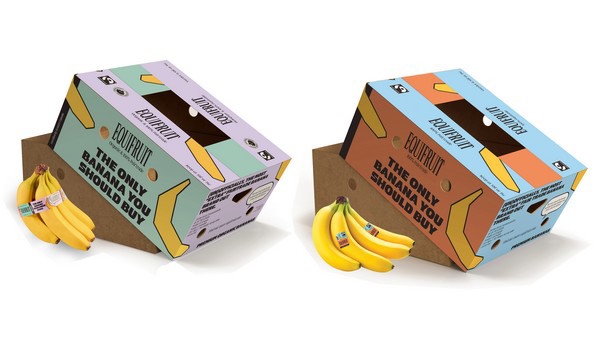For a long time, bananas have been the cheapest item in the produce section, if not the entire store. However, plantations in Latin America are often affected by this news in a negative way (bad working conditions), as the price continues to be too low to cover social and environmental protection for growers and their workers.
“It is our mission to change the banana industry and for Fairtrade bananas to achieve global domination,” says Jennie Coleman, President of Equifruit. Today, only four percent of the global banana export business is based on Fairtrade terms. This means 96 percent of exports don’t cover sustainable production. “Let’s change it,” commented Coleman.

Lowest priced item per pound
Why do retailers feel they need to offer bananas at such a low price? As an example, Coleman talked about an enormous high-end grocery store she visited in Boston, MA two weeks ago. “The huge entryway that led us into the store was filled with impulse items and one of them included a container with three decorated cookies for a staggering $8.93 (price per lb: $13.99). From there, we walked into the produce department where a massive banner greeted us, promoting bananas at $0.49/lb.,” Coleman shared.
After walking the entire store, she had to make the disappointing conclusion that bananas were the lowest priced product per pound in the entire store. Why would this high-end retailer compete on the price of bananas? Will consumers go to a different store if bananas are offered at a fair price?
Mindset change
“The price of bananas requires a mindset change, but how could it be changed when the contrast is so stark?” This is the core of the problem Equifruit is trying to solve. Most consumers are price takers and shop by habit. They will shop where it’s convenient. “With our Fairtrade bananas, we want to give our retail customers an injection of confidence and show that the success of a store does not rely on the price of bananas. We’ve observed that consumers buy on colour, not necessarily price.”
Harvard Business School
This is also what Coleman and her colleague Kim Chackal recently heard when they lectured at Harvard Business School. They were invited to discuss how a brand that is very mission driven can change people’s mindsets and purchasing behaviors.
“We were honored to discuss our case at MBA level, something that is very unusual,” said Coleman. “With the students, we discussed how we should focus our marketing as we sell B2B but communicate B2C. Do we communicate with the buyer for shelf space, or do we focus on gaining interest from the consumer?” The consensus was that we should focus on B2B as they are the gatekeepers. “If we don’t communicate well with the buyers, we will never get access to the consumer.” What also came out of the discussion is that consumers are willing to accept a price change if it’s communicated right, as a responsible choice.
 Jennie Coleman and Kim Chackal at Harvard Bussines School.
Jennie Coleman and Kim Chackal at Harvard Bussines School.
Europe
In the past year and a half, representatives from Ecuador, Colombia, and Guatemala have been discussing the low-price challenges with European retailers. After many meetings, they are witnessing progress. Just last month, German retailer Lidl committed to paying a price premium and so called “living wage” for bananas. In North America, it’s still a lonely drum to beat for Equifruit. For decades, retailers have been accustomed to focusing on the price of bananas. While it’s hard to not see this problem as unreasonable, it also drives Coleman and her team to continue making change.
“The opportunity for change is enormous. It was so encouraging to be noticed at one of the most well-known business schools in the world,” Coleman said. “The low price of bananas is a big issue that needs attention and we’ve managed to capture it. Will conversations with retailers be next?”
Interested in discussing more? Visit Jennie and the Equifruit team at CPMA in Toronto on April 26 and 27, booth #1039.
 For more information:
For more information:
Jennie Coleman
Equifruit
Tel: (+1) 514-910-4360
[email protected]
www.equifruit.com










